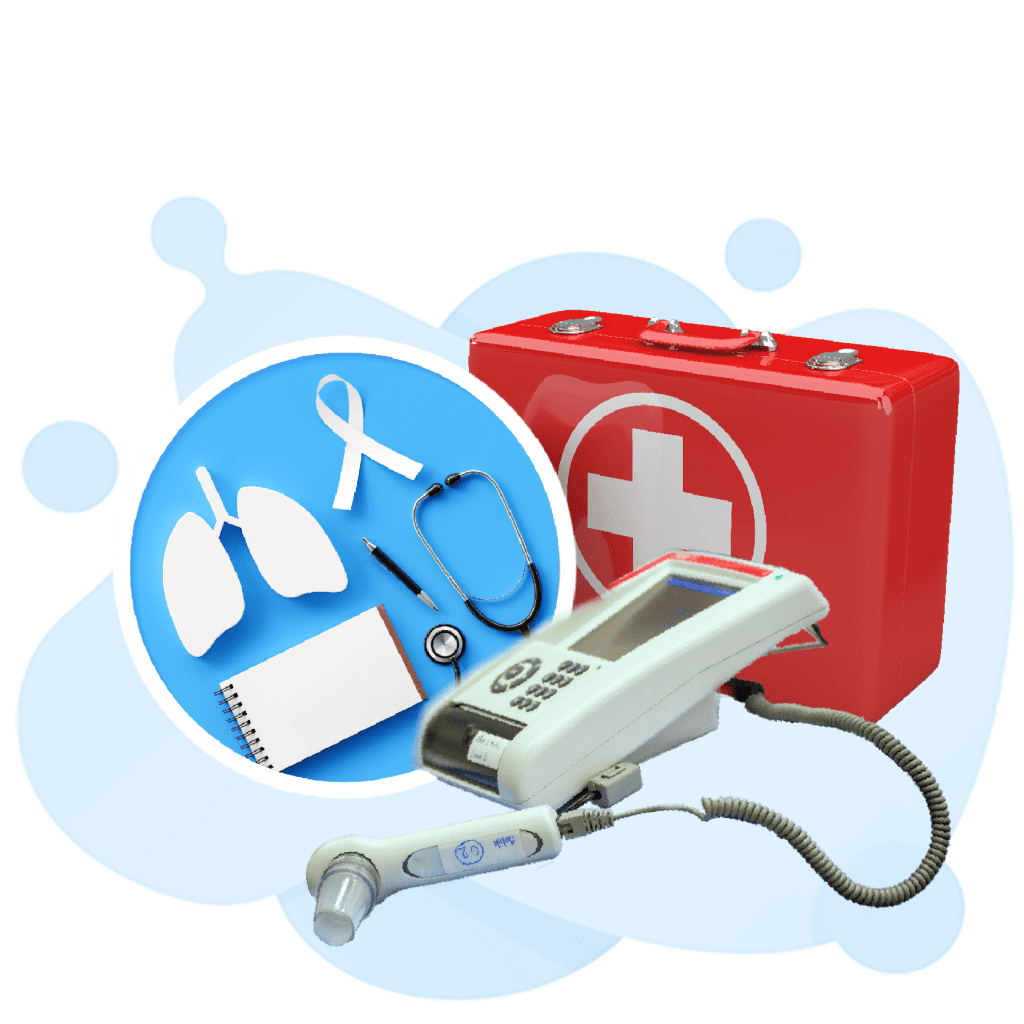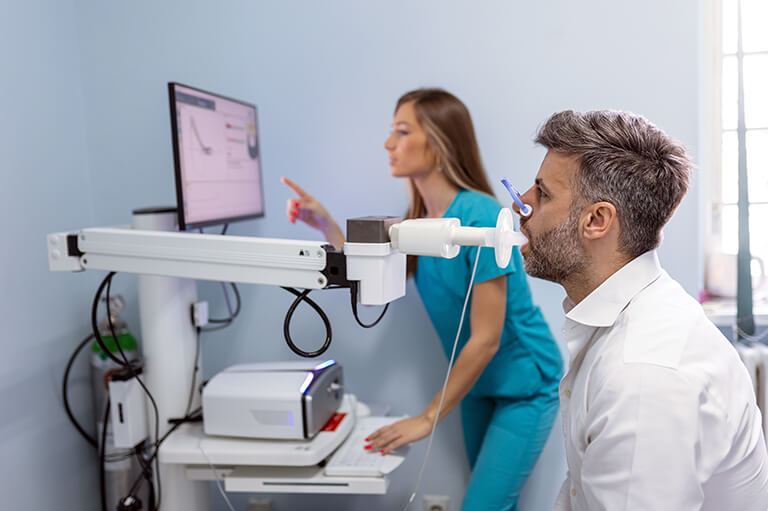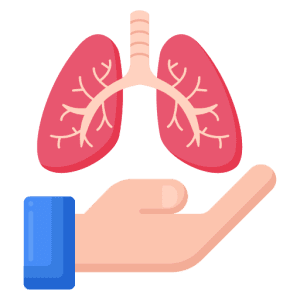RPFT Practice Exam

Pulmonary function technologists test a patient’s lungs for conditions and disorders. They also collaborate with other medical staff to diagnose patients and administer treatment. They work in hospitals, clinics, and health centers.
They follow physicians’ orders and prepare patients for tests, such as spirometry testing, lung volume testing, arterial blood gas sampling, and cardiopulmonary stress testing. They also clean, sterilize, and check equipment.
RPFT Standards
The pulmonary function technologist performs a variety of respiratory tests in hospital and clinical settings. They identify respiratory issues and help patients deal with them. They must have a high school diploma or equivalent and an associate degree from an accredited program in respiratory care. They also need a CRT or RRT credential from the National Board for Respiratory Care.
Pulmonary function technologists are able to perform pulmonary diagnostic testing such as forced expiratory volume in one second (FEV1) and maximum voluntary ventilation (MVV). They can also administer oxygen therapy per provider order, provide home oxygen assessments and 6-minute walks, conduct indirect calorimetry, and assist physicians during bronchoscopy procedures.
In addition to performing pulmonary function testing, pulmonary function technicians must be trained in American Heart Association Basic Life Support Healthcare Provider and Neonatal Resuscitation Program. They must be able to respond quickly and decisively to emergency situations. They also need to be able to work independently with minimal supervision and have excellent interpersonal communication skills. The most common major for pulmonary function techs is medical technician, followed by biology and business.
Kettering RPFT
The RPFT is a credential that validates the knowledge and skills of pulmonary function technologists. It’s offered by the National Board for Respiratory Care (NBRC). The exam is administered at PSI testing centers throughout the United States. The RPFT is accredited by the Institute for Credentialing Excellence.
The PFT examination objectively measures essential tasks required of pulmonary function technologists. It’s a badge of distinction that signals to employers, colleagues and patients that the holder is a highly skilled pulmonary function technologist who is committed to excellence in respiratory care. The RPFT also distinguishes pulmonary function technologists who have earned the high cut score on the examination from those who achieve the low score.
A RPFT must be able to work independently and have the ability to follow instructions. Moreover, they must be comfortable with the technical aspects of performing blood gas tests and interpreting results. This position requires critical thinking and decisive judgment, especially in stressful situations. They must be able to interact with clients in a professional manner, both in person and via phone.

RPFT Exam Study Guide
If you want to become a RPFT Certified Respiratory Function Technologist, you need to pass the RPFT exam. This test is administered through PSI Examination Services and is available online or at a testing center. The exam consists of 115 multiple-choice questions. Only 100 of these questions are scored, while the remaining 15 are pre-test questions used to collect statistical data and do not affect your results.
The RPFT exam study guide will help you prepare for the test by teaching you important facts about respiratory anatomy and physiology. It will also cover the types of equipment used in pulmonary function technology and the procedures that are performed on patients. It will also discuss common mistakes that are made during testing.
To ensure you are ready to take the RPFT, you should log in to your account ten minutes before your scheduled exam appointment. You should also make sure your testing area is free of any books, notes or electronic devices. If you have additional monitors, you must disconnect them.
RPFT Jobs
A pulmonary function technologist assesses a patient’s respiratory problems in a hospital or clinical setting. They also administer pulmonary diagnostic procedures. These tests may include spirometry lung volumes, maximum voluntary ventilations, diffusion of carbon monoxide studies and bronchial provocation tests. They also perform home oxygen assessments, indirect calorimetry and provide bronchoscopy assists.

Other duties of a pulmonary function technologist involve reading and interpreting physician orders and patients’ charts. They also clean, sterilize and check equipment for accuracy and safety. They are also responsible for establishing, maintaining and monitoring quality control systems.
Some pulmonary function technologists work in hospitals or clinics while others are employed by larger physicians’ offices. Some specialize in a certain area of respiratory care, such as neonatal-pediatrics or sleep. These professionals must have good organizational skills and be able to work with a variety of people. They also need to be able to make decisions quickly and work under pressure.
RPFT Requirements
The RPFT exam is designed to test a pulmonary function technologist’s knowledge of respiratory diseases. This includes the basic understanding of ventilation and gas exchange, pulmonary function tests, and oxygen therapy. It also covers the pathophysiology of common pulmonary disorders, such as asthma and COPD. It is important for a pulmonary function technologist to be able to correctly identify conditions and make recommendations based on their findings.
Pulmonary function technologists work with physicians to run tests on patients with suspected respiratory problems. They use these tests to help physicians diagnose and treat lung disease. They must be able to follow protocol and adhere to safety guidelines. In addition, they must be able to communicate clearly with the patient and interpret their results.
To become a pulmonary function technician, you must have an associate degree from an accredited respiratory therapy program or cardiopulmonary technologist training program and an RRT credential from the National Board for Respiratory Care. You must also be a BLS certified healthcare provider. The RPFT exam is administered by PSI Testing Centers and is offered at various locations around the country.

RPFT Salary
A RPFT is an expert in the respiratory field and often works closely with nurses and doctors to diagnose lung diseases. They also perform diagnostic tests on patients and may help medical researchers identify conditions that lead to disease. With a growing life expectancy and increasing prevalence of pulmonary diseases, these professionals are in high demand.
RPFTs are paid on an hourly basis, and their salary can range from $50,000 to $90,000. The average RPFT certification holder earns $56,500 per year, while the highest-paid ones make $98,000. This salary is much higher than the national average.
There are a few cities where RPFTs can expect to make more than the national average, including Santa Cruz, California and Livermore, California. The average salary in these top 10 cities is nearly 8% higher than the national average. However, the difference is not that significant, so it may not be worth moving to these areas just for the higher pay. This information is based on tax estimates for an individual filer with a 22% federal tax rate in 2018. Local taxes and other deductions vary.
Passing Score for RPFT
Passing the RPFT exam requires a combination of education and training. In addition, it is important to understand the types of questions and the scoring system. The test is two hours long and has 115 multiple-choice questions. It also includes 15 pre-test questions that are used to collect statistical data and do not count toward the score.

Those who successfully complete the RPFT exam will receive a certificate from the National Board for Respiratory Care. This certification is valid for five years. To renew it, respiratory therapists must take quarterly assessments and document 30 continuing education credits.
The RPFT exam is available online and at PSI Testing Centers. Applicants who submit an application online with a credit card can choose their test center, time, and date. The exam is computer-based and includes 115 questions. It is designed to assess the ability of respiratory therapists to provide safe, effective care to patients. In order to be eligible for the RPFT exam, you must have a minimum of two years of clinical experience.
RPFT Exam Prep
RPFT, or Registered Pulmonary Function Technologist, is an exam for respiratory care professionals. It tests the abilities of respiratory therapists to work with patients in a clinical setting. It also measures their skills in assessing a patient’s lung function. This test is designed to assess a person’s ability to perform their job in a safe and efficient manner.
The RPFT is administered online and uses multiple-choice questions to measure your knowledge of the subject matter. Each question you answer correctly earns one point toward your score. Your total score is compared to the cut score, which determines whether you pass or fail the test.
The RPFT exam is an advanced certification that requires a bachelor’s degree in pulmonary function technology and at least three years of clinical experience. To qualify, you must have a valid license and a current respiratory care practitioner registration. It is also important to have good communication skills and the ability to follow directions. RPFT certification can help you stand out in an interview, as employers are impressed by the fact that you are highly trained.